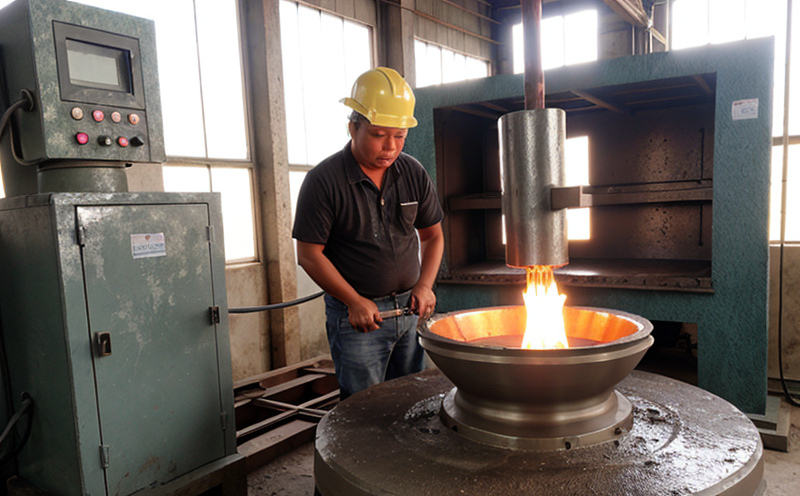ISO 8069 Sand Testing for Foundry Processes
The ISO 8069 standard provides a comprehensive framework for evaluating sand used in foundry processes. This testing is crucial because the quality of sand directly impacts the integrity and reliability of castings produced in the foundry industry. Sand used in casting must possess specific properties to ensure that it can withstand the extreme conditions encountered during the casting process, including high temperatures, molten metal contact, and mechanical stresses.
ISO 8069 specifies several key parameters for sand testing, which include particle size distribution, moisture content, permeability, and resistance to thermal shock. These properties are critical because they determine how well the sand will perform under various casting conditions. For instance, the particle size distribution affects the flow of sand during molding, while moisture content influences the drying time and final strength of the mold.
The testing process begins with obtaining a representative sample of the sand from the supplier or production site. The sample is then prepared according to ISO 8069 guidelines for accurate analysis. Particle size distribution is determined using sieve analysis, which involves passing the sand through a series of sieves with progressively finer openings and weighing the retained fractions. Moisture content is measured by drying samples in an oven at specified temperatures and comparing the dry weight to the wet weight.
Permeability testing assesses how easily gases can pass through the sand bed, which is vital for preventing gas porosity defects during casting. This test involves measuring the rate of air flow through a given volume of sand packed in a cylindrical mold under specified conditions. Resistance to thermal shock is tested by subjecting samples to rapid temperature changes and assessing their durability.
The results of these tests are used to evaluate whether the sand meets the requirements set forth in ISO 8069. Compliance with this standard ensures that the sand will perform reliably during casting processes, leading to higher quality castings with reduced defects. This is especially important for industries that rely heavily on foundry processes, such as automotive manufacturing, aerospace, and heavy machinery production.
In summary, ISO 8069 sand testing is essential for maintaining consistent quality in foundry processes. By adhering to this standard, manufacturers can ensure that their casting sands meet the necessary criteria for performance under extreme conditions. This not only enhances product reliability but also contributes to overall process efficiency and cost-effectiveness.
Customer Impact and Satisfaction
The implementation of ISO 8069 sand testing has a significant positive impact on customer satisfaction within the industrial manufacturing sector. By ensuring that foundry sands meet stringent quality standards, manufacturers can deliver products with higher integrity and reliability. This leads to reduced production downtime due to casting defects and improved overall product performance.
Customers in industries such as automotive and aerospace benefit greatly from consistent sand quality because these sectors demand highly precise and durable components. Ensuring that the sand used in foundry processes meets ISO 8069 specifications helps manufacturers meet customer expectations for reliability, accuracy, and durability.
For quality managers and compliance officers, compliance with ISO standards like 8069 provides a clear benchmark against which to measure performance. This not only enhances internal confidence but also facilitates smoother interactions with suppliers and customers. R&D engineers can use the results of these tests to optimize casting processes further, leading to innovations that improve product quality.
In summary, by adhering to ISO 8069 sand testing protocols, manufacturers demonstrate their commitment to excellence in foundry processes. This leads to increased customer satisfaction, improved product performance, and a competitive edge in the market.
International Acceptance and Recognition
The ISO 8069 standard has gained widespread acceptance across various countries due to its comprehensive approach to evaluating sand quality for foundry processes. This international recognition is driven by the standard's focus on ensuring consistent and reliable performance of casting sands under diverse environmental conditions.
Many leading industrial nations, including those in Europe (EN standards), North America, and Asia, have incorporated ISO 8069 into their national regulations and industry guidelines. For example, the European Committee for Standardization (CEN) has referenced ISO 8069 in its own standards related to foundry processes.
The standard's acceptance is not limited to manufacturing industries; it also extends to regulatory bodies that oversee industrial operations. This ensures a harmonized approach to quality assurance across borders, reducing the need for multiple sets of testing criteria and promoting global trade.
Manufacturers who comply with ISO 8069 are better positioned to meet international standards and regulations, which is increasingly important in today’s global market. The widespread acceptance of this standard also fosters confidence among customers and suppliers, as it provides a common language for quality assurance.
Environmental and Sustainability Contributions
The implementation of ISO 8069 sand testing contributes significantly to environmental sustainability in industrial manufacturing processes. By ensuring that foundry sands meet strict quality standards, manufacturers can reduce waste and energy consumption associated with suboptimal casting materials.
One key aspect is the optimization of sand usage through accurate testing, which allows for more efficient molding processes. This reduces the amount of raw material needed and minimizes waste generation during production. Additionally, the standard promotes recycling and reclamation practices, further reducing environmental impact.
In terms of energy consumption, compliant foundries can optimize their operations by selecting sands that perform well under extreme conditions. This leads to reduced heating and cooling requirements, ultimately lowering overall energy usage. The use of recycled sand also reduces the need for new raw materials, thereby conserving natural resources.
Furthermore, ISO 8069 supports sustainable practices by encouraging the development of environmentally friendly casting techniques. Manufacturers can adopt these practices while ensuring that their products meet stringent quality requirements. This dual approach—of maintaining high standards and promoting sustainability—sets a benchmark for responsible industrial processes globally.





